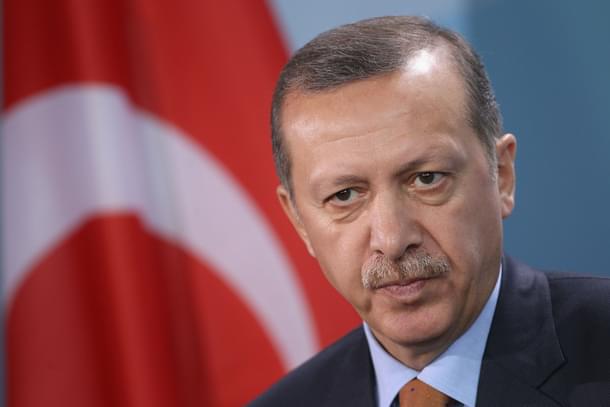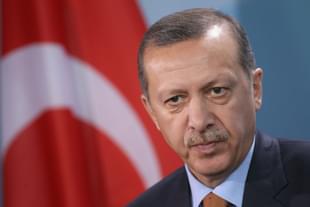News Brief
'Learn To Respect Sovereignty Of Other Nations': India Takes On Erdogan After He Again Brings Up Kashmir In UN
Swarajya Staff
Sep 23, 2020, 02:36 PM | Updated 02:36 PM IST
Save & read from anywhere!
Bookmark stories for easy access on any device or the Swarajya app.


President Recep Tayyip Erdogan of Turkey was told by the Indian representative at the United Nations (UN) to “learn to respect the sovereignty of other nations” after the former raised the Kashmir issue in his address at the UN General Assembly (GA).
In his virtual address during the UN GA debate, Erdogan called the Kashmir “conflict” a “burning issue” and said that the “steps taken following the abolition of the special status of Jammu-Kashmir further complicated the problem.”
T S Tirumurti, India’s permanent representative to the UN, said in a tweet:
“We have seen remarks by the President of Turkey on Indian UT of Jammu and Kashmir. They constitute gross interference in India’s internal affairs and are completely unacceptable. Turkey should learn to respect sovereignty of other nations and reflect on its own policies more deeply.”
Erdogan also said, “We are in favour of solving this issue through dialogue, within the framework of the United Nations resolutions and especially in line with the expectations of the people of Kashmir.”
Erdogan had raised the issue in 2019 UN GA as well, along with the Pakistan Prime Minister Imran Khan, to garner greater international attention on Kashmir. Malaysia’s Prime Minister Mahathir Mohamad was the only other leader to take Pakistan’s side at that time.
The scholars at the time had called it a rise of a ‘new Quad’ with China, Pakistan, Malaysia and Turkey as members.
India has always maintained that Kashmir is a bilateral issue to be settled within the Shimla Agreement 1972.
Turkey interjection into the Kashmir issue comes at the a time when Erdogan is trying to establishing itself as the leader of the Muslim world by replacing Saudi Arabia. Gulf countries, on the other hand, seem to be integrating themselves further with the western world as well as India and China.
In his February visit to Pakistan, Erdogan had compared the “struggle in Kashmir” with Turkey’s role in World War I. Erdogan was appealing to the ‘restoring the past glory of the Islamic empire’ narrative which incorporates the concepts like Ghazwa-i-Hind, Darul Islam etc.
The quick rise of the Islamic State that was able to attract fighters from diverse backgrounds, especially the young, educated, white collar proved to the leaders of the Muslim world that the idea of a caliphate continues to be popular and potent for mobilisation.
It is no surprise that ambitious leaders like Erdogan would try to latch onto the same narrative to push themselves to the top.
The recent conversion of Hagia Sophia, an ancient church, a world heritage site in Turkey into a mosque was symbolic of Erdogan’s committment to the ‘restoration of past glory’.
The timing couldn’t be better as Muslims grow increasingly disappointed with the Gulf nations for courting the west, the Arab Israeli peace accord being the latest “betrayal".
However, while Erdogan tries to portray himself as the defender of the Muslim world, his own treatment of Muslim minorities is questionable.
The Kurds, for example, have been fighting for their right and are suppressed violently. Erdogan has also been tight-lipped on the issue of Uighurs in China. A 2019 Telegraph report claimed that Turkey was, in fact, actively deporting the Uighurs who had taken refuge in the country, back to China. Last year, Erdogan had said that people in Xinjiang were living happily.




